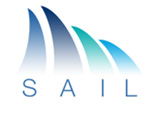I attended my second Concertation meeting as coordinator of SAIL last week. Already, when networking with my new-found peers in the EC ICT community, it is starting to feel natural to discuss in abstract terms around ‘strategic research agendas’ and ‘bridging between Research and Standardization’. (Wonder whether that is a good sign…) ![]()
Hmm, “concertation” you might say, what is that? Well, “co-ordination gathering” gives the same meaning and in my view in more straight forward words. This example of choice of wording though got me reflecting over how easy and unnoticed many of us adapt the jargon of certain communities we are interacting in. And even more how it effectively it may pull the curtain down for outsiders who possibly could have had an interest in taking part of what you are doing!
My point of the day being that in order for a large research project like SAIL to be successful in spreading our results and gain adoption of our innovations, we may never allow ourselves to take the “easy path” and start to limit ourselves by only talking about our work in fluffy wordings with unclear underlying meaning. What do for instance ‘Service Diversity’, ‘Functional flexibility’ and ‘Virtualization of resources’ mean to people outside of the (rather closed) ICT research arena? What does it mean to people on the industry side? What does it mean to intended consumers on the street?
By choosing a slightly more demanding path though, we will in the SAIL project secure that in whatever work we do, and whatever result we disclose, we refer to it in a context that shall be easy to relate to for a broader audience. I.e. that makes sense to everyday people with an interest in our industry! I see that our framework for doing this is our deliverable on Scenarios and Use-Cases, outlining in which – sometimes deliberately stretched – situations that we envision our technologies will be used in.
We are for sure not unique in the FP-community in describing use-cases for our foreseen work – it is seen from many of our related projects visible here at the Concertation (e.g. Medieval and UniverSelf). Where we though intend to make a difference is in the way we will use this document throughout our project – re-assuring that we do not fall into the trap of the “easy path”, by always having a tie between the languages prevailing within respective communities that we are interacting with – being it Academia, Industry, EU or the ‘Consumers on the street’.
As said initially, it is very easy to choose the “easy path” once you have the option, therefore I need you to watch over me and to alarm me once you see me or any of my colleagues in the project diverging!
Disclosure and disclaimer: I am engaged in the SAIL project, on behalf of Ericsson. However the opinions expressed in this post are my personal, and not those of the SAIL project or my employer.







